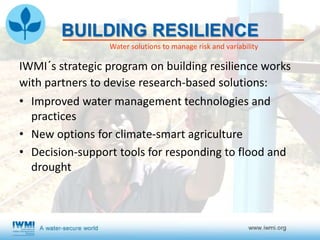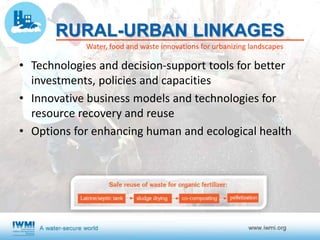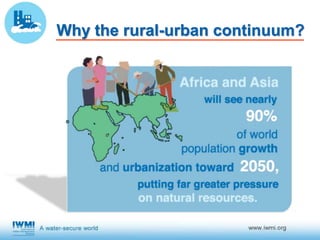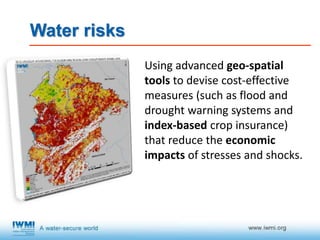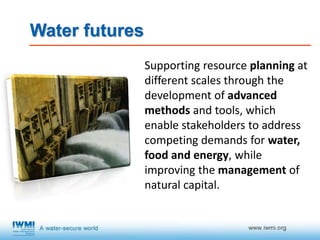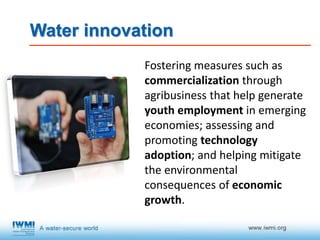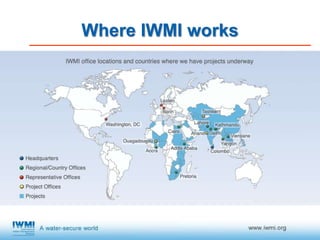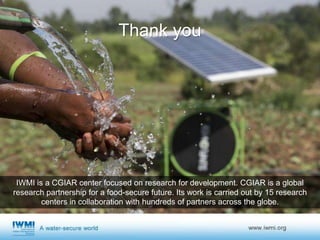IWMI in Action
- 1. IWMI in Action An overview of IWMI’s work
- 2. About IWMI Mission: Provide evidence-based solutions to sustainably manage water and land resources for food security, people’s livelihoods and the environment Vision: A water-secure world Core values: Excellence, objectivity, integrity, knowledge sharing, impact orientation, partnerships and teamwork, and respect for diversity
- 3. • Think tank conducting research to generative innovative solutions • Provider of science-based products and tools • Facilitator of learning to strengthen capacity and achieve uptake of research findings Our multiple roles in research for development
- 4. Our focus on global challenges IWMI’s strategic programs build an evidence base for new approaches that address key water- related development challenges: – Building Resilience – Sustainable Growth – Rural-Urban Linkages
- 5. BUILDING RESILIENCE IWMI´s strategic program on building resilience works with partners to devise research-based solutions: • Improved water management technologies and practices • New options for climate-smart agriculture • Decision-support tools for responding to flood and drought Water solutions to manage risk and variability
- 6. Why does resilience matter?
- 7. SUSTAINABLE GROWTH • Knowledge, tools and methods for future scenario and trends analysis • Water innovations for agriculture and agribusiness • Options for achieving inclusive and gender- sensitive outcomes Water management for transforming economies
- 8. Sustainable growth for whom?
- 9. RURAL-URBAN LINKAGES • Technologies and decision-support tools for better investments, policies and capacities • Innovative business models and technologies for resource recovery and reuse • Options for enhancing human and ecological health Water, food and waste innovations for urbanizing landscapes
- 10. Why the rural-urban continuum?
- 11. Putting knowledge to work Our researchers work across sectors and disciplines to deliver new knowledge, policy advice and capacity development.
- 12. Agricultural water Developing water and land management solutions that improve production and lessen the risks for rainfed agriculture, while enhancing irrigated production and identifying options for more “intelligent” resource use.
- 13. Groundwater Identifying policy and management solutions through new partnerships and innovative field research that promote sustainable use of this resource and help reduce conflicts over water quantity and quality.
- 14. Water risks Using advanced geo-spatial tools to devise cost-effective measures (such as flood and drought warning systems and index-based crop insurance) that reduce the economic impacts of stresses and shocks.
- 15. Water futures Supporting resource planning at different scales through the development of advanced methods and tools, which enable stakeholders to address competing demands for water, food and energy, while improving the management of natural capital.
- 16. Water innovation Fostering measures such as commercialization through agribusiness that help generate youth employment in emerging economies; assessing and promoting technology adoption; and helping mitigate the environmental consequences of economic growth.
- 17. Governance and gender Identifying institutional and policy measures that offer inclusive access to water and other resources, with special emphasis on gender equality in changing rural economies.
- 18. Resource recovery Analyzing technical, institutional and business options for the recovery of water, nutrients and energy from human and agricultural waste to reduce pollution and lower the costs of treatment, while increasing its benefits.
- 19. Water and health Addressing risks posed by unsustainable urbanization and agricultural intensification through innovations such as safe use of marginal quality water to produce and process higher quality food, with emphasis on urban and peri- urban agriculture.
- 20. Where IWMI works
- 21. Thank you IWMI is a CGIAR center focused on research for development. CGIAR is a global research partnership for a food-secure future. Its work is carried out by 15 research centers in collaboration with hundreds of partners across the globe.
Editor's Notes
- You may change the photo shown by going to VIEW>SLIDE MASTER Click and delete the photo Insert a new photo Click SLIDE MASTER > CLOSE MASTER VIEW





